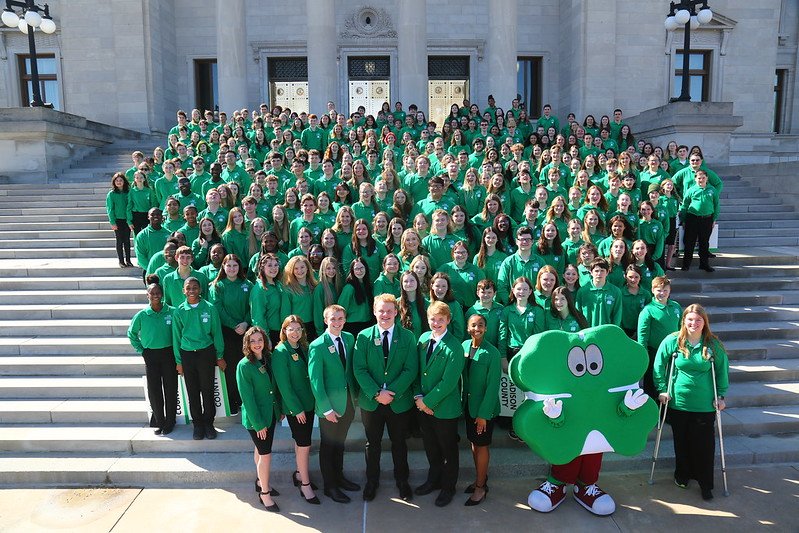By Tracy Courage
U of A System Division of Agriculture
LONOKE, Ark. — Though fair season is still months away, the poultry competition officially began April 24 when more than 2,000 Arkansas 4-H members from 68 counties in Arkansas received their chicks as part of the 4-H Poultry Chain project.
CHICK MAGNET — Shane Gadberry, assistant vice president for agriculture and natural resources with the University of Arkansas System Division of Agriculture, loads baby chicks into the cars of 4-H agents who delivered birds to more than 2,000 4-H members statewide who are participating in the 4-H Poultry Chain Project. (Division of Agriculture photo.)
The program teaches youth about poultry management and animal husbandry. Each participant received a set of 17 pullets — each the same age and breed from the same hatchery. Over the next few months, the youth will put the knowledge they have gained into practice in raising the birds.
Most will take their best birds to county fairs, some will advance to the state fair, and many will use their flocks to start egg-selling businesses.
All in a day’s work
In just over 24 hours, some 36,000 chicks were transported overnight from a Texas-based hatchery to the Lonoke County Fair Grounds, where Cooperative Extension Service personnel unloaded and sorted the birds.
Extension agents from across Arkansas picked up their county’s birds and distributed them to 4-H members in their respective counties. By late afternoon, the birds were settling into their new homes.
4-H members began preparing long before the birds’ arrival — setting up brooders, stocking up on feed and shavings, and purchasing brooder plates, which keep the young birds warm and are preferred over heating lamps, which pose fire risks.
They’ve also learned about biosecurity measures to protect their flocks from disease, especially avian flu.
“My favorite part of this project is that everyone starts on the same day, with birds of the same genetics,” Logan County 4-H agent Sarah Enoch said. “By fair time, their husbandry, what they’ve done to feed and care for the chicks, really shows. It’s a more level playing field than other livestock projects.”
Gateway to 4-H
The Poultry Chain project is one of the most popular programs for Arkansas 4-H, the youth leadership program operated by the Cooperative Extension Service.
Enoch has about 50 4-H members raising chickens this year.
“Poultry Chain is our most popular 4-H program in Logan County,” she said. “It’s the gateway to 4-H. From chickens, some kids will become interested in showing a pig or a goat or want to try other projects.”
4-H offers more than 50 project areas that focus on healthy living, citizenship, leadership and the STEM fields of science, technology, engineering and math.
Logan County’s 4-H Foundation buys the chicken for its county 4-Hers, who raise the birds and take their best three to the county fair. The rest of their flock is theirs to keep.
The birds are judged and awarded blue, red or white ribbons. Blue-ribbon chickens are the cream of the crop and often sell for higher prices in the public auction. The proceeds go back to the Foundation to pay for the next year’s chickens and to support 4-H programs, Enoch said.
Similar scenarios play out in other counties, though not all counties have foundations to pay for the birds, and not all fairs have auctions.
Burgeoning business
With current egg prices, many 4-H members are doing a swift business and often have wait lists of folks wanting to buy fresh eggs. While some buyers may be hoping to beat supermarket prices, many people are willing to pay competitive prices for fresh eggs raised by local youth.
“Everyone is excited to get 4-H eggs,” Prairie County 4-H program assistant Amanda Sinkey said. Half of the county’s 40 4-H members participate in Poultry Chain, and many of them are looking forward to selling eggs.
“One of our members has repeat customers from year to year, and she sells eggs for $3 a dozen.”
Twelve-year-old Adam Hammond who lives near Hope, has had a poultry project for four years. He currently has 18 layers and typically collects 16-18 eggs a day. While Adam is responsible for caring for the flock, his mother, Brittney, helps with marketing and delivery. She posts egg availability on Facebook and she and her son deliver the eggs to customers.
Adam sells the eggs in flats of 30 for $10.
“We feel that’s a good deal,” Brittney Hammond said. “We usually sell between two to five flats a week, depending on if it’s a good week or not.”
The experience has been a valuable lesson in money management as youth learn that not all egg revenue is free money — after costs of feed, supplies and tax are taken out.
Buyers’ preference
This year, Poultry Chain participants received Lohmann whites, a breed known to be good layers though a bit flighty and less friendly than other breeds. Many kids prefer to raise breeds that lay brown eggs to suit their customers.
“When people see white eggs, they think store-bought,” When they see brown eggs, they think farm fresh,” Brittney Hammond said.
Andrew Bolton, extension’s poultry instructor for youth programs, initially worried that participation in Poultry Chain might dip this year, based on breed preference and because of avian flu concerns.
Instead, participation increased slightly with a total of 2,108 recipients. The program is open to 4-H and Future Farmers of America members.
Bolton attributes the increased participation to egg demand and higher egg prices. Increased interest is good news in Arkansas, where poultry production accounts for 1 in 4 agriculture jobs in Arkansas, he said.
“The poultry industry is one of the largest industries in our state, and we always need people to work, whether that’s working in a plant, supervising feed mills, equipment operations, or in research and development,” Bolton said. “There are lots of options, and we hope this sparks an interest.”
To learn more about 4-H, visit 4h.uada.edu, contact your local Cooperative Extension Service agent, or visit www.uaex.uada.edu. Follow us on X and Instagram at @AR_Extension. To learn more about Division of Agriculture research, visit the Arkansas Agricultural Experiment Station website: https://aaes.uada.edu. Follow on X at @ArkAgResearch. To learn more about the Division of Agriculture, visit https://uada.edu/. Follow us on X at @AgInArk.





















